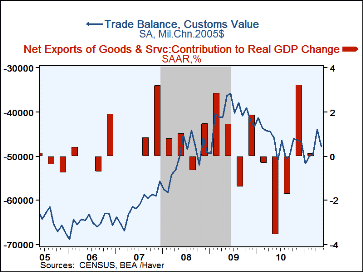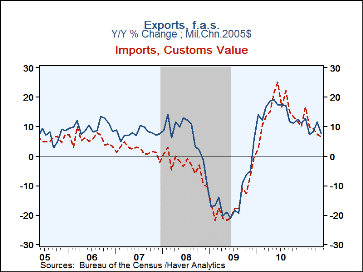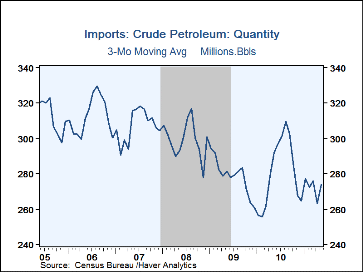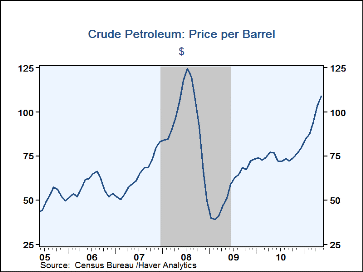 Global| Jul 12 2011
Global| Jul 12 2011U.S. Trade Deficit Surges With Oil Imports
by:Tom Moeller
|in:Economy in Brief
Summary
The foreign trade deficit jumped in May to $50.2B from a little-revised $43.6B in April. Expectations had been for $43.6B according to Action Economics. The latest figure was the deepest since October, 2008 as imports jumped 2.6% with [...]
The foreign trade deficit jumped in May to $50.2B from a little-revised $43.6B in April. Expectations had been for $43.6B according to Action Economics. The latest figure was the deepest since October, 2008 as imports jumped 2.6% with higher oil prices and exports fell 0.5%. In chained 2005 dollars, the overall deficit in goods deepened to $47.7B as real imports rose 1.6% (6.5% y/y) and real exports fell 1.5% (+7.6% y/y).
Petroleum imports jumped 10.3% (41.9% y/y) as the per barrel cost of crude oil rose to $108.70 from $103.18 in April. Twelve months earlier, prices averaged $76.95. In constant dollars petroleum imports rose 6.0% but fell 0.6% y/y.
Overall imports rose 2.6% (+15.9% y/y). Goods imports increased 2.8% (17.7% y/y). Nominal imports of foods, feeds & beverages rose 1.0% (18.9% y/y) though when adjusted for higher prices imports rose just 2.1% y/y. Nonauto capital goods imports jumped 14.9% y/y and virtually all of the y/y gain reflected higher volumes. Nonauto consumer goods imports rose 7.7% y/y and the gain was all real. Auto imports rose a lessened 0.7% y/y.
Total exports slipped 0.5% (+15.0% y/y) after a 1.4% April increase. A 1.2% decline (+17.0% y/y) in goods exports translated to a 1.5% drop (+7.6% y/y) in real terms. The y/y real increase reflected a 10.5% rise in capital goods, a 5.9% gain in industrial supplies and a 3.0% rise in nonauto consumer goods. Real automobile exports rose 15.3% y/y.
Services exports increased 0.9% (9.5% y/y) reflecting 11.5% y/y growth in travel and a 14.0% y/y rise in passenger fares. Imports of services rose 0.9% (5.4% y/y), reflecting lesser changes in travel and passenger fares, held back by the lower dollar.
By country, the goods trade deficit with China increased to $25.0B as exports rose a lessened 15.8% y/y and imports rose an also lessened 12.8% y/y. (Imports are roughly four times the level of U.S. exports.) The trade deficit with Japan again improved sharply to $2.6B as exports rose 9.2% y/y but imports fell 3.8% y/y. (Imports from Japan are roughly twice the level of U.S. exports.) The trade deficit with the European Union deepened back to $8.8B as U.S. exports rose 16.5% y/y but imports grew 22.1%. (Imports from Europe are roughly one-third larger than U.S. exports.)
The international trade data can be found in Haver's USECON database. Detailed figures are available in the USINT database. The expectations figure is in the AS1REPNA database.
Will China Ever Become as Rich as the U.S.? from the Federal Reserve Bank of Dallas is available here.
| Foreign Trade | May | Apr | Mar | Y/Y | 2010 | 2009 | 2008 |
|---|---|---|---|---|---|---|---|
| U.S. Trade Deficit | $50.2B | $43.6B | $46.8B | $42.2B (5/10) |
$500.0B | $381.3B | $698.3B |
| Exports-Goods & Services (M/M) | -0.5% | 1.4% | 4.9% | 15.0% | 16.7% | -14.5% | 11.4% |
| Imports-Goods & Services | 2.6 | -0.3 | 4.2 | 15.9 | 19.5 | -23.0 | 8.1 |
| Petroleum | 10.3 | -5.3 | 15.6 | 41.9 | 32.5 | -44.0 | 37.0 |
| Nonpetroleum | 0.9 | 0.7 | 2.4 | 0.9 | 20.8 | -20.9 | 1.5 |
Tom Moeller
AuthorMore in Author Profile »Prior to joining Haver Analytics in 2000, Mr. Moeller worked as the Economist at Chancellor Capital Management from 1985 to 1999. There, he developed comprehensive economic forecasts and interpreted economic data for equity and fixed income portfolio managers. Also at Chancellor, Mr. Moeller worked as an equity analyst and was responsible for researching and rating companies in the economically sensitive automobile and housing industries for investment in Chancellor’s equity portfolio. Prior to joining Chancellor, Mr. Moeller was an Economist at Citibank from 1979 to 1984. He also analyzed pricing behavior in the metals industry for the Council on Wage and Price Stability in Washington, D.C. In 1999, Mr. Moeller received the award for most accurate forecast from the Forecasters' Club of New York. From 1990 to 1992 he was President of the New York Association for Business Economists. Mr. Moeller earned an M.B.A. in Finance from Fordham University, where he graduated in 1987. He holds a Bachelor of Arts in Economics from George Washington University.










